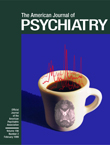Amygdalar Volume and Emotional Memory in Alzheimer’s Disease
Abstract
OBJECTIVE: Everyday experience suggests that highly emotional events are often the most memorable. Experimental work in animals and humans has demonstrated that the amygdaloid complex plays a crucial role in emotional memory, i.e., memory of events arousing strong emotions. The aim of this study was to elucidate the relationship between medial temporal damage and impaired memory of real-life emotional events in patients with Alzheimer’s disease. METHOD: In 36 patients with probable Alzheimer’s disease who experienced the 1995 earthquake in Kobe, Japan, memories of events surrounding the earthquake were examined as an index of emotional memory with the use of a semistructured interview, and amygdalar and hippocampal volumes were quantified by magnetic resonance imaging. The effects of the atrophy of these structures on recall performance were determined by multiple regression analysis. RESULTS: Irrespective of generalized brain atrophy and cognitive impairments, emotional memory was correlated more with normalized amygdalar volume (right and left averaged) than with normalized hippocampal volume. General knowledge of the earthquake was correlated with neither amygdalar nor hippocampal volume. CONCLUSIONS: The results indicate that impairment of emotional event memory in patients with Alzheimer’s disease is related to intensity of amygdalar damage and provide evidence of the amygdala’s involvement in emotional memory in humans.



